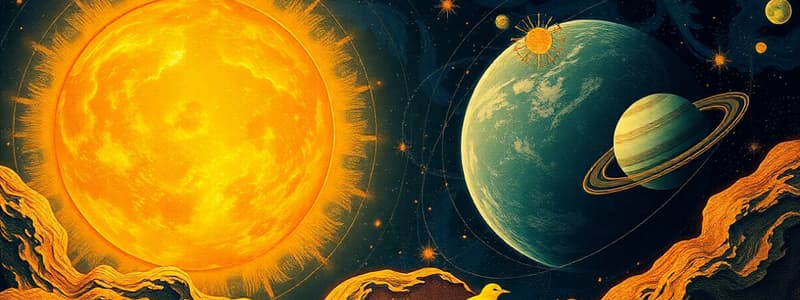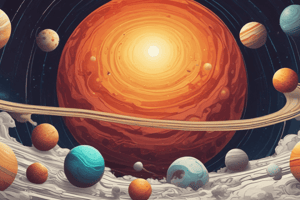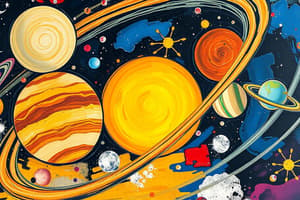Podcast
Questions and Answers
Which planet is the smallest in the solar system?
Which planet is the smallest in the solar system?
Earth has more than one moon.
Earth has more than one moon.
False (B)
What percentage of Earth's surface is covered with water?
What percentage of Earth's surface is covered with water?
71%
Venus is known as the _______ planet due to its brightness.
Venus is known as the _______ planet due to its brightness.
Signup and view all the answers
Match the following planets with their special characteristics:
Match the following planets with their special characteristics:
Signup and view all the answers
Which of the following statements is true regarding the two groups of planets?
Which of the following statements is true regarding the two groups of planets?
Signup and view all the answers
Mars has three moons.
Mars has three moons.
Signup and view all the answers
What is the origin of the name Jupiter?
What is the origin of the name Jupiter?
Signup and view all the answers
Which planet is known as the King of Roman Gods?
Which planet is known as the King of Roman Gods?
Signup and view all the answers
The inner planets are made up mostly of gas.
The inner planets are made up mostly of gas.
Signup and view all the answers
What are the two groups of planets in the solar system?
What are the two groups of planets in the solar system?
Signup and view all the answers
The largest planet in the solar system is ______.
The largest planet in the solar system is ______.
Signup and view all the answers
Which statement is true regarding the revolution time of the planets?
Which statement is true regarding the revolution time of the planets?
Signup and view all the answers
Match the following planets with their type:
Match the following planets with their type:
Signup and view all the answers
The inner planets are generally _______ compared to the outer planets.
The inner planets are generally _______ compared to the outer planets.
Signup and view all the answers
Name one difference between inner planets and outer planets.
Name one difference between inner planets and outer planets.
Signup and view all the answers
Flashcards
Smallest Planet
Smallest Planet
Mercury is the smallest planet in our solar system.
Inner Planets
Inner Planets
The inner planets are closer to the sun than the outer planets.
Outer Planets
Outer Planets
The outer planets are farther from the sun than the inner planets.
Venus: Veiled Planet
Venus: Veiled Planet
Signup and view all the flashcards
Earth: Water Percentage
Earth: Water Percentage
Signup and view all the flashcards
Mars: Gravity and Volcano
Mars: Gravity and Volcano
Signup and view all the flashcards
Jupiter: Largest Planet
Jupiter: Largest Planet
Signup and view all the flashcards
Saturn: Rings
Saturn: Rings
Signup and view all the flashcards
What are the two main planet groups?
What are the two main planet groups?
Signup and view all the flashcards
What makes inner planets unique?
What makes inner planets unique?
Signup and view all the flashcards
What makes outer planets unique?
What makes outer planets unique?
Signup and view all the flashcards
What is the difference in composition?
What is the difference in composition?
Signup and view all the flashcards
How do inner and outer planets differ in size?
How do inner and outer planets differ in size?
Signup and view all the flashcards
What is the main difference in revolution time?
What is the main difference in revolution time?
Signup and view all the flashcards
How does distance from the sun affect temperature?
How does distance from the sun affect temperature?
Signup and view all the flashcards
What is the key difference between inner and outer planets?
What is the key difference between inner and outer planets?
Signup and view all the flashcards
Study Notes
The Solar System
- The solar system is the sun and all the objects that orbit it.
- These objects include eight planets, at least five dwarf planets and countless asteroids, meteoroids, and comets.
Lesson Objectives
- Students will be able to identify and describe the major components of the solar system.
- Students will be able to identify at least three characteristics of each planet in the solar system.
Starter Activity
- Choose one planet and write one fun fact about it.
The Solar System - Questions
- Question 1: Mercury is the smallest planet in the solar system.
- Question 2: Inner planets (closest to the sun) and outer planets (farthest from the sun) differ significantly in size, composition, and number of moons; gas giants have more moons, for example, and have atmospheres composed mainly of gas, while terrestrial planets have rocky, solid surfaces
- Question 3: Venus has a significant feature: it is the hottest planet in the solar system.
- Question 4: 71% of Earth's surface is covered with water.
- Question 5: About the star at the center of our solar system: The Sun is the star at the center of our solar system.
Planets
- The eight planets in our solar system are Mercury, Venus, Earth, Mars, Jupiter, Saturn, Uranus, Neptune.
Planet Characteristics
- Mercury:
- Origin: Roman Messenger God
- Special characteristics: Extremely hot during the day, freezing cold at night.
- Color: Grey
- Moons: 0
- Venus:
- Origin: Roman Goddess of Love
- Special feature: Veiled planet, hottest planet, rotates clockwise.
- Color: Yellowish-white
- Moons: 0
- Earth:
- Origin: Eartha - Ground (German)
- Color: Blue
- Special Features: 71% of the surface is covered in water, has solid, liquid, and gaseous parts, supports life
- Moons: 1
- Mars:
- Origin: Roman God of War
- Special features: Largest volcano, 1/3 of Earth's gravity
- Color: Red
- Moons: 2
- Jupiter:
- Origin: King of the Roman Gods
- Special Feature: Shortest day, high gravity.
- Color: Orange with white bands
- Biggest planet
- Moons: 53
- Saturn:
- Origin: Roman God of Farming
- Special Feature: Has rings of ice, lightest planet.
- Color: Light yellow
- Second biggest planet
- Moons: 53
- Uranus:
- Origin: Greek God of the sky
- Special Feature: Tilted on its axis, cold and windy
- Color: Light blue
- Moons: 27
- Neptune:
- Origin: Roman God of the sea.
- Special feature: Coldest and windiest planet.
- Color: Blue
- 4th largest planet (size)
- Moons: 13
Checkpoint:
- Describe three key differences between Earth and Venus.
- Describe two differences between Uranus and Neptune.
Questions
- What is the name of the star at the center of our solar system? Answer: The Sun.
- Which planet is known as the "Red Planet"? Answer: Mars.
- Which planet is known for its prominent rings? Answer: Saturn.
- What celestial body orbits the Earth and affects tides? Answer: The Moon.
- Which planet is known for having the most moons? Answer: Jupiter (with 53 moons)
Glossary
- Solar system: The Sun and all the objects that orbit it.
- Galaxy: A large collection of stars, gas, and dust.
- Universe: The entirety of space and time, including all matter and energy.
- Asteroid: A small, rocky object that orbits the Sun.
- Comet: A small, icy object that orbits the Sun.
- Meteoroid: A small rock traveling in space.
- Meteor: A meteoroid that enters the Earth's atmosphere.
- Meteorite: A meteor that survives its passage through the atmosphere to strike the surface of the Earth.
- Satellite: An object that orbits a planet.
- Lunar: Relating to the Moon.
- Orbit: The path of an object as it travels around another object in space.
- Rotation: The spinning of an object around its axis.
- Revolution: The orbital motion of one object around another.
- Stellar: Relating to a star.
Studying That Suits You
Use AI to generate personalized quizzes and flashcards to suit your learning preferences.
Description
Test your knowledge about the solar system through this quiz. From the eight planets to fascinating facts about dwarf planets and asteroids, explore the major components that make up our celestial neighborhood. Learn to identify key features of each planet and deepen your understanding of this vast cosmic system.



